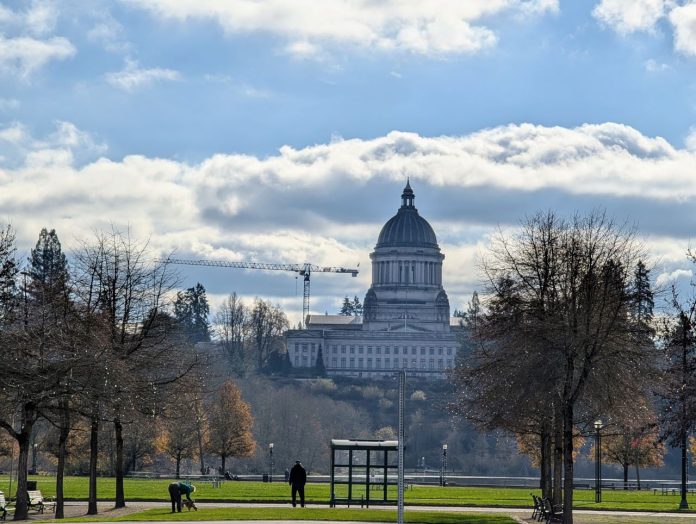
A corporate front group is pushing ads trying to block taxing the rich to solve a state budget crisis.
You have probably seen “People for an Affordable Washington” advertisements splashed all over social media. They’re not actually people, but a corporate lobbying firm bankrolled by Microsoft, Alaska Air, the Alliance for a Competitive Economy, Madrona, and T-Mobile. Those are their top five funders.
The Alliance for a Competitive Economy enables the corporate bedfellows of the Association of Washington Business, the Washington Roundtable, and the Washington Research Council to cover for business in a seemingly harmless coalition, now fronted by the “People for an Affordable Washington.”
This corporate front group is running ads intent on cutting public services on which the people in our state rely. They use phony statistics and demeaning Trump-like rhetoric to take down public services. Here’s one claim they make: “Over the last decade, state spending has skyrocketed 114%, an increase of $38.4 billion.”
Let’s take this apart. 2014 government programs for the people of Washington state added up to $45 billion. 2024 government programs amount to $92 billion. This initially seems like a big increase. But when you factor in inflation, it is not 114%, but rather less than half of what the propaganda wants you to believe.

Now consider that our population has not been stagnant for the past 11 years, but growing — a lot, in fact by 1 million people, so that now over 8 million people live in our state. We can’t run a state by just providing services only to those people who lived here in 2014! When we factor in this population growth, then spending per capita has not doubled, has not increased by half, has not even increased by one third.
But we are still leaving something out. Since 2014, personal income, adjusted for inflation, has almost doubled (94%). Personal income has also run way ahead of state expenditures. We have a witch’s brew of fiscal scarcity, thanks to our lack of an income tax, our reliance on sales taxes, and the shift of personal income from the middle class (who actually use their income for household expenditures and thus pay sales taxes) to the very wealthy, who are more likely to vacation out of the country. As a result, state and local taxes as a proportion of personal income fell by one fifth in the past 50 years.
You most likely have not felt enriched over the past decade, but that is because the increases in personal income have largely accrued to the already wealthy. And because public spending for higher education, early childhood education, K-12, and parks, among other services, have not kept up with both inflation and need, you end up paying more. You may feel pinched, not thriving.

While over half of all personal income in our state is gained by the top quintile of residents, middle class families are faced with higher education tuition in the tens of thousands of dollars, child care costs that exceed college tuition, and average health care out-of-pocket costs of almost $1,500.
The solution to enable good public services is not to cut public services, as the corporate front group says: “WA State needs lower costs…” What would this corporate front group wish to cut? Perhaps our paid family and medical leave program, a literal lifesaver for half a million Washingtonians and their families, costing $1.8 billion in 2024.
How about unemployment compensation? That costs about $2 billion a year. How about workers compensation? That’s to protect employers from the legal costs of negligent working conditions and enable injured workers to gain some compensation for their physical injuries. The cost is $7 billion a year.
How about the long-term care program? The business community tried to get the voters to abandon this with an initiative in 2024. Washington voters refused to take the bait, and reinforced public long-term insurance, which is projected to cost about $1 billion a year.
Note that workers compensation, unemployment compensation, paid family and medical leave, and long-term insurance all work to enable the private market to thrive by moving social costs and liability from private corporations to public services. So do the “People for Affordable Washington” want to reduce public services and increase private corporate costs?
Maybe we are asking the wrong question? Why are Microsoft, Amazon, Alaska Air, and their corporate allies concerned about government spending? Simply because they don’t want the Legislature to examine the tens of billions of dollars of tax loopholes built into the tax code (thanks to corporate lobbying) which favor the corporate elite and the very wealthy.
But now the Legislature is actually suggesting closing some corporate tax loopholes. These fiscally responsible legislators are also proposing a wealth tax and a tax on the employers of affluent workers. This is a good start.
But given the public services that are already underfunded by the state, and the gaping holes in funding as the Trump/Vance/Musk administration cuts trillions from the federal budget, we in Washington are going to need a lot more.
One thing the Legislature could do that they haven’t touched yet is to reach back to a Microsoft-inspired loophole that enabled Microsoft to avoid taxation of digital products, just by opening a sales office in Nevada and claiming that the product did not originate in Washington state. The enabling legislation also included a Trump-like amnesty for these companies for several years of unpaid taxes. This nifty little maneuver resulted in a revenue loss exceeding $1 billion a year, totaling at least $15 billion since its inception.
Now that is a loophole the “People for an Affordable Washington” would not want to see closed, threatening the bankrollers of their propaganda. Microsoft, with its $300,000 contribution, would not appreciate being made part of the solution.
They don’t really care about stabilizing and rebuilding public services. But this restored funding would surely be appreciated by the parents of young children trying to pay for child care or the students who want to gain an associate’s degree or bachelor’s degree without going deep into debt. They are the citizens who desperately need an affordable Washington.

John Burbank (Guest Contributor)
John Burbank is the founder and retired executive director of the Economic Opportunity Institute in Seattle.

